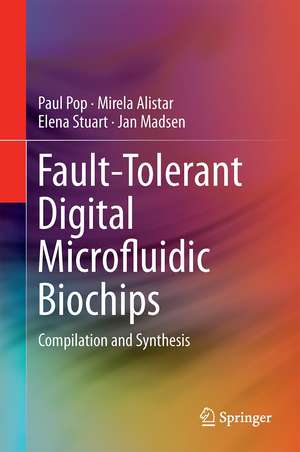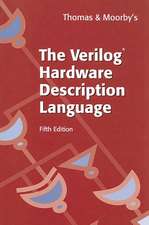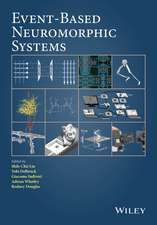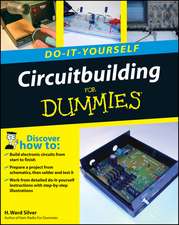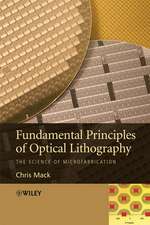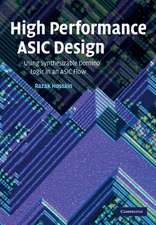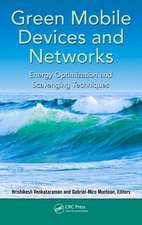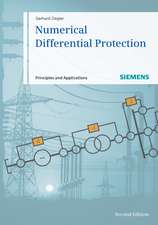Fault-Tolerant Digital Microfluidic Biochips: Compilation and Synthesis
Autor Paul Pop, Mirela Alistar, Elena Stuart, Jan Madsenen Limba Engleză Hardback – 15 sep 2015
· Presents the current models used for the research on compilation and synthesis techniques of DMBs in a tutorial fashion;
· Includes a set of “benchmarks”, which are presented in great detail and includes the source code of most of the techniques presented, including solutions to the basic compilation and synthesis problems;
· Discusses several new research problems in detail, using numerous examples.
| Toate formatele și edițiile | Preț | Express |
|---|---|---|
| Paperback (1) | 638.11 lei 6-8 săpt. | |
| Springer International Publishing – noi 2016 | 638.11 lei 6-8 săpt. | |
| Hardback (1) | 644.30 lei 6-8 săpt. | |
| Springer International Publishing – 15 sep 2015 | 644.30 lei 6-8 săpt. |
Preț: 644.30 lei
Preț vechi: 758.01 lei
-15% Nou
Puncte Express: 966
Preț estimativ în valută:
123.28€ • 129.07$ • 102.01£
123.28€ • 129.07$ • 102.01£
Carte tipărită la comandă
Livrare economică 05-19 aprilie
Preluare comenzi: 021 569.72.76
Specificații
ISBN-13: 9783319230719
ISBN-10: 3319230719
Pagini: 234
Ilustrații: XII, 234 p. 109 illus., 82 illus. in color.
Dimensiuni: 155 x 235 x 20 mm
Greutate: 0.53 kg
Ediția:1st ed. 2015
Editura: Springer International Publishing
Colecția Springer
Locul publicării:Cham, Switzerland
ISBN-10: 3319230719
Pagini: 234
Ilustrații: XII, 234 p. 109 illus., 82 illus. in color.
Dimensiuni: 155 x 235 x 20 mm
Greutate: 0.53 kg
Ediția:1st ed. 2015
Editura: Springer International Publishing
Colecția Springer
Locul publicării:Cham, Switzerland
Public țintă
ResearchCuprins
Introduction.- Biochips: technologies and trends.- Digital microfluidic biochips.- Biochip architecture models.- Biochemical application programming and applications models.- Design methodology: the compilation and synthesis problems.- State-of-the-art research on compilation and synthesis.- Module-based compilation with reconfigurable operation execution.- Routing-based compilation.- Compilation for error recovery.- Synthesis of fault-tolerant architectures.- Synthesis of application-specific architectures.- Benchmarks and evaluation.- Conclusions and future work directions.
Notă biografică
Paul Pop is has joined DTU Compute as an associate professor in May 2006. Previously, he was an assistant professor at Linköping University, Sweden, where he has received his Ph.D. in Computer Systems in 2003. Paul’s research is about methods for systems engineering: modeling, analysis, simulation and optimization. Systems engineering is the treatment of engineering design as a decision making-process. He has applied systems engineering methods in the design of embedded systems, which are special-purpose computer systems dedicated to perform a specific function.
Textul de pe ultima copertă
This book describes for researchers in the fields of compiler technology, design and test, and electronic design automation the new area of digital microfluidic biochips (DMBs), and thus offers a new application area for their methods. The authors present a routing-based model of operation execution, along with several associated compilation approaches, which progressively relax the assumption that operations execute inside fixed rectangular modules. Since operations can experience transient faults during the execution of a bioassay, the authors show how to use both offline (design time) and online (runtime) recovery strategies. The book also presents methods for the synthesis of fault-tolerant application-specific DMB architectures.
· Presents the current models used for the research on compilation and synthesis techniques of DMBs in a tutorial fashion;
· Includes a set of “benchmarks”, which are presented in great detail and includes the source code of most of the techniques presented, including solutions to the basic compilation and synthesis problems;
· Discusses several new research problems in detail, using numerous examples.
· Presents the current models used for the research on compilation and synthesis techniques of DMBs in a tutorial fashion;
· Includes a set of “benchmarks”, which are presented in great detail and includes the source code of most of the techniques presented, including solutions to the basic compilation and synthesis problems;
· Discusses several new research problems in detail, using numerous examples.
Caracteristici
Presents the current models used for the research on compilation and synthesis techniques of digital microfluidic biochips (DMBs) in a tutorial fashion Includes a set of "benchmarks", which are presented in great detail and includes the source code of all the techniques presented, including solutions to the basic compilation and synthesis problems Discusses several new research problems in detail, using numerous examples
